
ABC Carnival '74
Across the Board
Baloney
Bamboozle
Be What You Want
Beat The Genius
Beat The Odds (1962)
Beat The Odds (1975)
Bedtime Stories
The Better Sex
The Big Money
The Big Payoff
Big Spenders
Blank Check
Body Language
Body Talk
The Buck Stops Here
Bullseye
Call My Bluff
Card Sharks (1996)
Casino
Caught in the Act
Celebrity Billiards
Celebrity Doubletalk
Celebrity Secrets
Celebrity Sweepstakes
Chain Letter (1964)
The Challengers (1974)
Change Partners
Child's Play
The Choice Is Yours
Combination Lock (1996)
Comedy Club
Concentration (1985)
The Confidence Game
Cop Out
Countdown (1974)
Countdown (1990)
The Couples Race
Crossword
Decisions, Decisions
Dollar a Second
Duel in the Daytime
The Fashion Show
Fast Friends
$50,000 a Minute
Finish Line (1975)
Finish Line (1990)
Get Rich Quick
Going, Going, Gone!
Head of the Class
High Rollers
Hollywood Squares (1965)
Hollywood Squares (1985)
The Honeymoon Game
Hot Numbers
Hot Potato
House to House
How Do You Like Your Eggs?
Jackpot (1984)
Jeopardy (1977)
Jokers Wild
Jumble
Key Witness
Keynotes (1986)
King of the Hill
Let's Make a Deal (1963)
Let's Make a Deal (1990)
The Love Experts
M'ama Non M'ama
Match Game (1962)
Match Game (1973)
Match Game (1990)
Match Game (1996)
MatchGame (2008)
Mindreaders
Missing Links
Monday Night QB
Money Words
Money in the Blank
Moneymaze
Monopoly (1987)
Nothing But the Truth
Now You See It (1986)
Oddball
100%
PDQ
Party Line
People On TV
Play For Keeps
Play Your Hunch
The Plot Thickens
Pot O' Gold
Pressure Point
The Price Is Right (1972)
Pyramid (1996)
Pyramid (1997)
A Question of Scruples
Quick as a Flash
Razzle Dazzle
Riddlers
Run For The Money
Says Who?
Scrabble (1990)
Second Guessers
Second Honeymoon
Sharaize
Shoot for the Stars
Shoot the Works
Shopping Spree
Show Me
Showoffs
Simon Says
$64,000 Question (2000)
Smart Alecks
Smart Money
Spellbinders
Spin-Off
Split Decision
Star Cluster
Star Play
Strictly Confidential
TKO
Talking Pictures (1968)
Talking Pictures (1976)
Tell It to Groucho
Temptation (1981)
$10,000 Sweep
Three of a Kind
Tic Tac Dough
Tie-Up
Top Secret
Twenty One (1982)
Twenty Questions
Twisters
Up and Over
The Waiting Game
We've Got Your Number
What Do You Want?
What's On Your Mind
Wheel of Fortune
Whew!
Whodunit
Whose Baby
Wipeout
Word Grabbers
Write Your Own Ticket
You Bet Your Life (1988)
You Bet Your Life (1991)
You're Putting Me On
Show a Random Pilot
Show Unreviewed Pilots
Bob Stewart Flow Chart
Party Line
Producer: Reg Grundy
Host: Gene Rayburn
Announcer: Jay Stewart
Taping Info: 1983
Other Pilots: Yes. This was the first of three, but the only one to be hosted by Gene Rayburn. The others were helmed by eventual host Bruce Forsyth.
Made It To Air: Eventually, after three pilots, for a brief time in 1986.
Availability: Trading circuit
In the early 80's, Australian mega-producer Reg Grundy attempted to crack the American market. After making his fortune by taking mostly Goodson-Todman formats and making them popular in Australia, he took his revamping of the non G-T Sale of the Century back to the States and made it a hit. This pilot was an attempt to bring an original format to the U.S. market. Gene Rayburn, fresh from nine years on Match Game, is the star of the show. Additionally, professional pilot player Laura Chambers is one of the contestants.
Two teams of five players, segregated by genders, competed in a phrase identification game with a twist. The first player on the team is given a word or phrase to convey Pyramid-style, such as "violin". The second player guesses the word, and then taps the third player, who is listening to music on the headphones on the shoulder and then tries to guess the word from clues from the second player, without using any key words the first player used. This processes repeats, with the third player giving clues to the fourth player, using clues that haven't been used, but without knowledge of what the first player said. If this is successful, then the fourth player attempts to give clues to the fifth player without the knowledge of what the first or second player said. And, if a repeated word didn't stop you, the clock could, since you only had 40 seconds. Got that?
Each team did this for three rounds, earning one point for each successful guess of the word or phrase. If the game was tied after three rounds, they just played another round. When this show made it to air several years later, the rounds were played for cash.
In the event of a tie in the main game, a sudden death round was played. The first clue givers from each team were shown the word, and the defending champions had the choice whether to pass or play. To win the tie-breaker, the team playing the word would have to get entirely down the line, otherwise the other team won. Based on the scores I saw in the pilot, it was better to pass.
In the bonus game, the winning team had the assistance of nine other players who I guess were stored away for this very purpose. One player on the team had to relate the clue to the new nine players, one at a time, without repeating any key information. If the player felt that his or her ideas were gone, s/he passed the baton (literally) to the next player on their team and they tried. The pot doubled from $100 for each player who guessed the clue, with the team continuing until 40 seconds were up or they reused a key word. After the first try, the team could forfeit their winnings for a second chance. This varied significantly from the eventual show whose bonus game did not have the extra nine players.
This game is a minor cult classic in the game show fan world, but I didn't really like it. The fourth and fifth player slots was just absolute luck in saying something different, there really wasn't much skill that could be used. Gene Rayburn proves again that he was a very good host, as he squeezed as much life as he could from such a weak format.
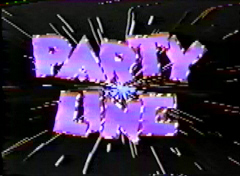 The opening screen. Does anybody under 40 even know what a party line is? |
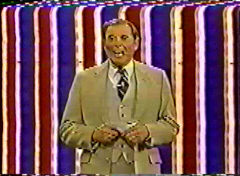 And your host, Gene Rayburn. |
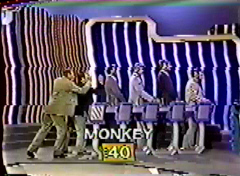 The men get ready to give a word. |
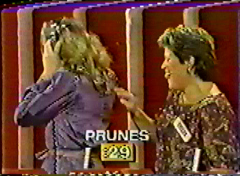 While the women are in the midst of their round. |
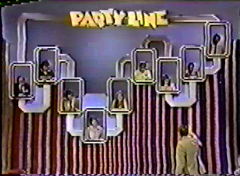 Apparently they got a deal from the Rowan and Martin garage sale. |
This pilot has been viewed 13361 times since October 6, 2008 and was last modified on Dec 12, 2009 14:46 ET
Feedback? Contact me at usgs-pilot at the usgameshows dot net domain